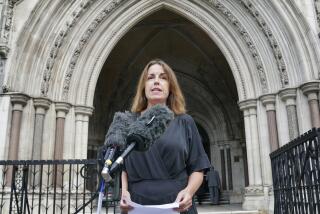Britons Divided by Probe Into Alleged Falklands Atrocities : An ex-soldier’s memoirs have reopened an incident in the 1982 war against the occupying Argentines. Charges involve killing prisoners and the cutting off of ears as trophies.
- Share via
LONDON — The British effort to regain the Falkland Islands long has been regarded here as the stuff of military legend--an air, sea and land triumph against a greater Argentine force. But a darker side of the campaign has emerged, involving charges of war crimes that could lead to civilian prosecution of combat paratroopers.
An 18-month investigation--by Scotland Yard detectives--is scheduled to be submitted to the director of public prosecutions early in the new year.
The probe has embittered many in the military and others who believe the honor of Falklands heroes should not be stained so long after the heated battles.
The Daily Mail described the investigation as “the betrayal of our heroes” and called for an end to it. “Stop this lunacy now,” pleaded Max Hastings, editor of the Daily Telegraph and a leading war correspondent during the three-month Falklands War.
But other voices have been raised in defense of British justice, arguing that the investigation should get to the bottom of the charges and recommend prosecutions, if appropriate, although skepticism is great here that any convictions can be won against lauded combat veterans.
The case concerns the reported actions of members of the Parachute Regiment’s crack Third Battalion, which on June 11 and 12, 1982, fought a bloody battle for Mt. Longdon, a strategic height overlooking the Argentine-captured capital of Port Stanley.
Some paratroopers are suspected of shooting Argentine prisoners in cold blood in the aftermath of the fierce, successful battle--which claimed the lives of 23 British soldiers, including Sgt. Ian McKay, posthumously awarded Britain’s highest decoration for valor, the Victoria Cross.
The charges that Argentine prisoners were murdered were reported to senior army officers in 1982, military sources say. They were not investigated then because they lacked corroboration. And officials may have believed that, after the military victory, suspect actions that occurred in the heat of battle should be quietly ignored.
But in 1991, Lance Cpl. Vincent Bramley, a machine-gunner with the Third Battalion, published his memoirs. The book, “Excursion to Hell,” reopened the incident--to the distress of many involved, including Bramley himself.
“I never expected the book to result in an investigation,” Bramley, now out of the army, said in an interview. “I only wrote the book to tell people what the war and battle was like from an ordinary soldier’s viewpoint. There are plenty of senior officers who knew what happened.”
But once Bramley’s book was in print, some Labor members of Parliament, such as Tam Dalyell, called for an investigation. Defense Minister Malcolm Rifkind, a cautious politician without military experience, passed the buck to the director of public prosecutions.
The bureaucracy then began to clank, with Scotland Yard detectives interviewing paratroopers, many of them now retired. Detectives made two separate visits to the Falklands and appeared on Buenos Aires broadcasts in search of witnesses.
Because British soldiers are bound by civilian as well as military law, the Ministry of Defense can refer complex cases to civilian agencies. Though loath to take on such investigations, Scotland Yard says it must follow through--submitting its findings to the director of public prosecutions, who then may issue indictments on charges ranging from manslaughter to murder.
In his book, Bramley detailed two incidents on Mt. Longdon in which unnamed comrades allegedly shot four prisoners after they surrendered. He also claimed that some British soldiers defiled enemy corpses, cutting off ears for trophies. His claims were borne out by his senior officer, Capt. Anthony Mason, now a civilian, who says he reported the killings to his superiors without result.
Mason told a recent TV program that though rights of prisoners of war are “sacrosanct,” one had to consider the “sheer fear and confusion” of the hand-to-hand bayonet fighting--and the mental state of the soldiers.
In Argentina, President Carlos Saul Menem said he is unhappy with the investigation, declaring, “Let’s bury the past.”
Most senior British officers are resigned to the likelihood that investigators will end up with recommendations that may tarnish the army’s image. Gen. Anthony Farrar-Hockley, colonel commandant of the Parachute Regiment during the Falklands War, said: “The allegations cannot be pushed aside.”
But many observers appear to agree with Editor Hastings, who declared of the probe: “It may be argued that all this is tremendously honorable and British. Yet surely there must be some time limit beyond which it is against the public interest to pursue alleged crimes committed in war. Today, when so few adults have known war at first hand, there is a growing tendency to suppose that the moral absolutes of peacetime civilian life can be transferred to the battlefield.”
The Dark Side of Victory
Scotland Yard is probing charges British troops committed war crimes during their winning campaign to take back the Falkland Islands from an occupying Argentine force in 1982. The investigation was prompted by revelations in the memoirs of former Lance Cpl. Vincent Bramley, below.
More to Read
Sign up for Essential California
The most important California stories and recommendations in your inbox every morning.
You may occasionally receive promotional content from the Los Angeles Times.













